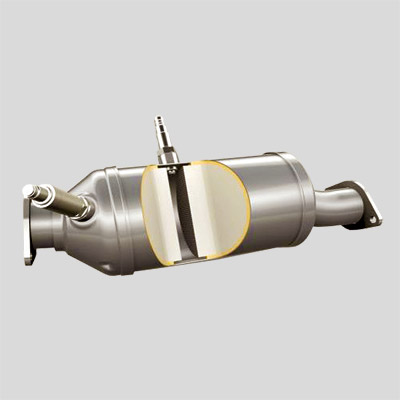Forté technical tips – The Gasoline Particulate Filter
Gasoline Particulate filters are fitted to petrol engines to meet the Euro 6c (2017) regulation on particulate numbers for gasoline engines. The GDI (Gasoline Direct Injection) is increasing its share within the marketplace of spark-ignition engines.
Direct Injection engines help improve fuel economy and reduce CO2 emissions; however, due to shorter air/fuel mixing times in the cylinder emit higher volumes of particulates than standard gasoline engines.
Gasoline Particulate Filter (GPF) technology enables the reduction of particulate emissions from the tailpipe. The EU6c emissions regulation in 2017 will see particulate number emissions of 6 x 1011 particles/km introduced for all spark-ignition engines and will lead to the fitment of Gasoline Particulate Filters.
The GPF will regenerate more easily than a DPF (Diesel Particulate Filter), known as passive regeneration mode and is induced naturally when the driver stops accelerating and the temperature of the filter is hot enough.
Gasoline engine exhaust temperatures range between 300°C and 500°C under urban driving conditions, but can reach 700°C at high speed (motorway) driving and are relatively higher than diesel engine-out temperatures. Under stoichiometric conditions, these temperatures should be high enough to sustain passive regeneration; however, due to a shortage of oxygen, regeneration generally occurs during vehicle deceleration, where the fuel is cut-off and oxygen becomes available in the exhaust. GPF systems with oxygen storage capabilities may also allow short periods of lean operation to initiate passive regeneration. Soot emitted from GDI vehicles oxidises much faster than diesel soot and thermal durability is not considered an issue leading to more effective regenerations and storage capability.
To overcome the fitment of Gasoline Particulate Filters, some manufacturers are adopting the Dual Injection System. Dual injection is a combination of direct and indirect injection. Injectors are located in the air intake (low pressure) and in the combustion chamber (high pressure) in the same engine. In part-load operation, the indirect injection assists direct gasoline injection in improving fuel economy and reducing the output of particulates from the engine. The system combines high-pressure direct injection and the lower-pressure MPI system.
Correct and efficient operation of the gasoline Particulate Filter is highly dependent on exhaust gas temperatures. Maintaining fuel system cleanliness is imperative for effective combustion and maintaining temperature. Incomplete combustion dramatically reduces exhaust gas temperature and leads to incomplete regeneration and blocking of the Gasoline Particulate Filter, leading to faults within the exhaust gas after the treatment system.
Complete petrol system clean:
In many cases, this can be rectified by cleaning the fuel system. Add 1 x Forté Advanced Formula Petrol Treatment and 1 x Forté Petrol Specialist Injector Cleaner to the fuel tank and conduct a road test which promotes temperature and deceleration. For example, a 60 mph dual carriageway with traffic lights and roundabouts.
Compatible with all petrol fuel; E5, E10 and up to E20.
Find out more with Forté.

